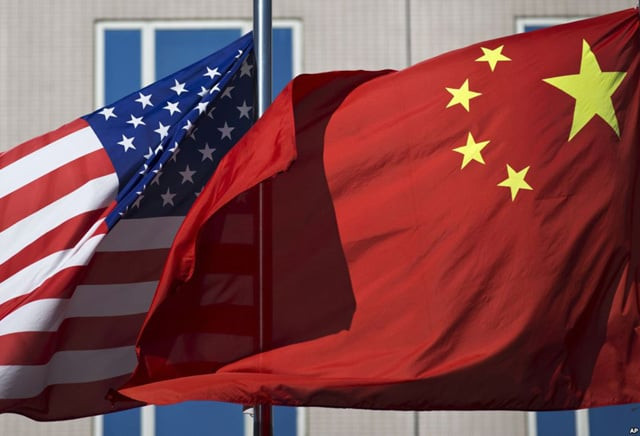China deploys riot police across Hong Kong, tensions with US rise
China claims internal matter, US argues global concern and international peace and security

PHOTO: AP/File
Heated debate over the bill - the latest spark of anti-government unrest in the semi-autonomous city - saw lawmakers removed in chaotic scenes from the Legislative Council which was then adjourned.
Police fired pepper pellets and made 360 arrests on Wednesday as thousands took to the streets in anger over the anthem bill and national security legislation proposed by China that has raised international alarm over freedoms in the city.
On Thursday, dozens gathered in a shopping mall, chanting “good kids don’t become cops,” and “reclaim Hong Kong.”
China’s National People’s Congress, its parliament, is due to approve the decision to go forward with a law tackling secession, subversion, terrorism and foreign interference on Thursday. It is expected to be enacted before September.
US Secretary of State Mike Pompeo said Hong Kong no longer qualified for special treatment under US law, potentially dealing a crushing blow to its status as a major financial hub.
The proposed security law was “only the latest in a series of actions” undermining Hong Kong freedoms, he told Congress.
“No reasonable person can assert today that Hong Kong maintains a high degree of autonomy from China, given facts on the ground,” he said.
The new security law could see Chinese intelligence agencies set up bases in the city that was given a high degree of autonomy under the “one country, two systems” terms of its 1997 handover to China by former colonial power Britain.
At the Legislative Council, opposition lawmaker Ted Hui ran into the hall carrying a plastic bottle with what he said was rotten plants, which he dropped onto the floor, causing a bad smell that forced everyone to leave.
Firemen were called to inspect it.
“The rotten thing is ‘one country two systems’, the rotten thing is rule of law,” Hui said.
Chinese authorities and the Beijing-backed government in Hong Kong say there is no threat to the city’s high degree of autonomy and the new security law would be tightly focused.
The United States and China clashed over Hong Kong at the United Nations on Wednesday after Beijing opposed a request by Washington for the Security Council to meet over the national security legislation.
The US mission said it was “a matter of urgent global concern that implicates international peace and security”. China said the legislation was an internal matter.
“SHOW TIME”
Tensions between the two superpowers had already been rising over the South China Sea, trade and the coronavirus pandemic.
“Already, international business is facing the pressure of increased tension between the U.S. and China, but the enactment of China’s security law for Hong Kong could take the tension to a whole new level,” said Tara Joseph, president of the American Chamber of Commerce in Hong Kong.
“This is show time for Hong Kong,” Joseph said in a commentary in the South China Morning Post.
Hong Kong stocks led losses in Asia, dropping more than 2%.
U.S. President Donald Trump has promised an announcement on what action he will take over Hong Kong at the end of the week. More than 1,300 U.S. companies have offices in the city, providing around 100,000 jobs.
Trump’s possible response could include visa and economic sanctions, David Stilwell, the State Department’s assistant secretary for East Asia, told reporters.
“Sanction is painful but necessary,” Agnes Chow from Hong Kong’s pro-democracy group Demosisto told reporters.
China’s security plan ignited the first large protests in Hong Kong for months, after the city was rocked by often violent pro-democracy demonstrations in 2019 over an unsuccessful bid to introduce an extradition law to China.
Protesters and pro-democracy politicians say Hong Kong’s National Anthem Bill, which aims to govern the use and playing of the Chinese national anthem, represents another sign of what they see as accelerating interference from Beijing.
The anthem bill is expected to become law next month.



















COMMENTS
Comments are moderated and generally will be posted if they are on-topic and not abusive.
For more information, please see our Comments FAQ